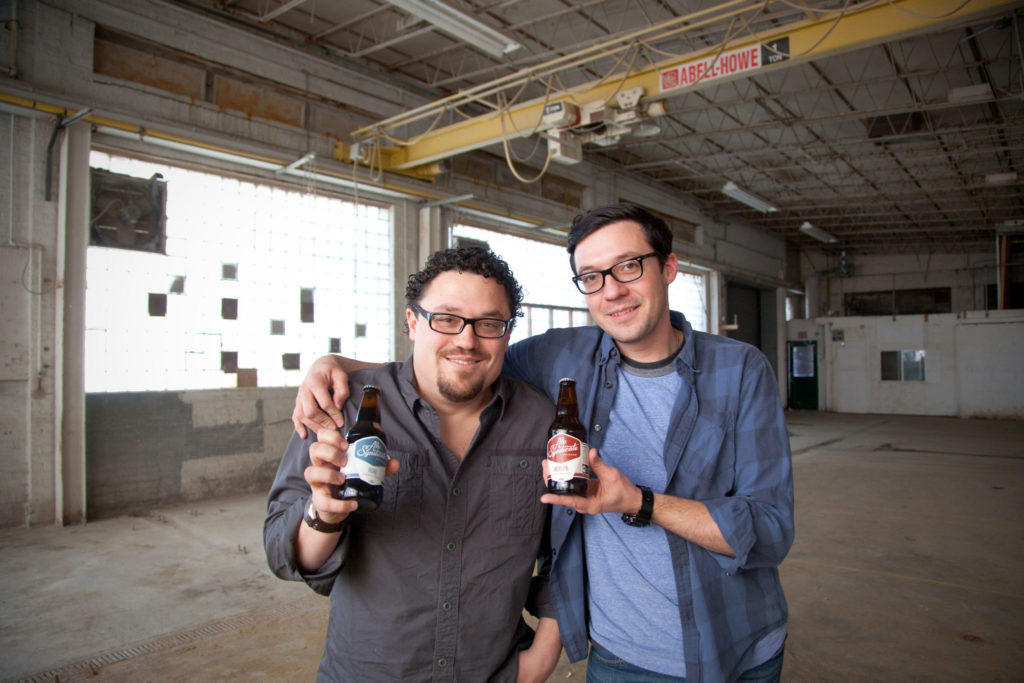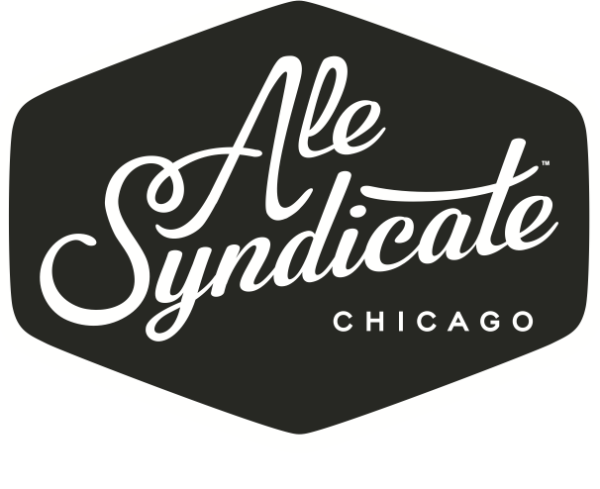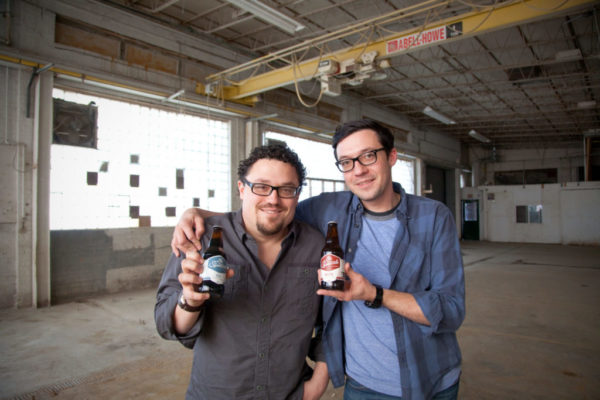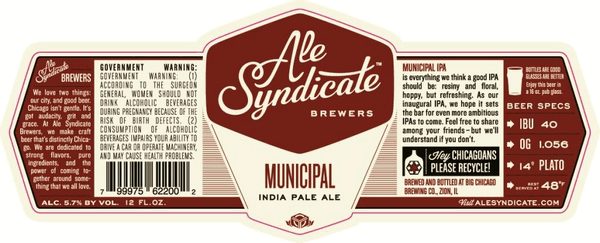This Q&A is part of an ongoing series highlighting “Makers,” those who make beer, make decisions and make the policies impacting you — the craft beer drinker.
To say that the road to Ale Syndicate’s first brew in their own brewery has been a long and a difficult one would be a wild understatement.
The Brothers Evans, Samuel and Jesse, first entered the Chicago scene a few years ago with plans to start New Chicago Brewing Company at the Plant in Back of the Yards. It was an aggressive, innovative, interesting idea. An energy-conserving sustainable brewery in an underserved community where the grain would feed plants and fish in the same building? Aiming for 12,000 barrels in the first year? Crops grown on site? In 2011, this was like announcing you were going to open a brewery on the moon.In Chicago, any brewery announcement was still novel enough to incite a mad flurry of press. We covered them here and for Draft Magazine, HuffPo covered them (check that future political byline, BTW), and even the Mayor visited. Things were promising.
Then they disappeared.
After a period of time where they kept their heads down, they re-emerged in February 2012 as Ale Syndicate. Since then, it’s been full steam ahead. Their first round of brews — Sunday Session, Richie Porter and Municipal IPA — rolled out in early 2013, an IndieGogo campaign got their fermenter count up before they even opened, and finally they started brewing at their Green Exchange space in late July.
Other than a few run-ins at bars across the city, we haven’t talked with the Brothers Evans in a few years. Now that they’re finally brewing on their own gear, we thought it would be a good time to check in.
We spoke with Jesse Evans in the middle of their fourth brewday. He teased us with a little info that he divulged a day or two later — they’d finalized the hiring of Richard Grant, bringing him back into the fold with head brewer Brian Shimkos. Both of them worked together at Flossmoor Station, Finch’s and a Rock Bottom or two, so it’s a bit like getting two bands together to create a bit of a brewing supergroup.
We talked about their new system, what they learned from the whole New Chicago process, the RateBeer “Best New IL Brewery” award and more:
GDB: You guys just started brewing on a 20bbl brewhouse with five fermenters — three 40’s, a brite and a 20bbl from the IndieGogo campaign. Was that brewhouse the size you were going to get back when you were at the Plant?
JE: Back at the Plant we were going to do a 20bbl, but then you know that’s long since changed. And at our place we were originally intended to have a 10bbl system, so we were very lucky to purchase the 20bbl system from Bristol Brewing company in Denver when they went from 20 to 50. So we are really happy that it’s kinda got a heritage to it, and it’s a really solid piece of equipment. I like that it has a story already.
GDB: That’s interesting — it used to be that that kind of transaction used to be the rule, rather than the exception. Back when one brewery would expand other people would get into the game. But so many people have jumped in, almost everyone has been forced to buy new. I’m kinda surprised you were able to find something used.
JE: Frankly, I’m very surprised myself, Karl! But it’s a really, really great system that’s just a nice manual brewing system, you’re really in there doing the work, making beer on it. I don’t know — it has a really nice feel to it.
GDB: I’d have to go back and look at all the dates, but I feel like I’ve been following your guys’ progress for a really long time. We’re talking like, going back to when you announced New Chicago Brewing. Do you remember when that was? 2010?
JE: It would all be guesses at this point. But yeah, it would have been around 2011 when we first thought we were getting close to opening. [laughs]
GDB: That’s an incredibly long process! It must be pretty gratifying to finally be working on your own system. I mean, I know you‘ve had beer in the market for a while, but doing it yourself in your own facility has gotta be a pretty big milestone.
JE: I cannot tell you how fantastic and amazing it is. You know, everybody that I’ve gotten involved in the brewery too, we’ve kept the space through this whole time; Abigail Kempf has been here the entire time working for this, we’ve known Brian Shimkos the whole time, and he was always my and my brother’s dream to be able to hire him, and now he’s in there making beer right now in the kettle.
So I am extremely pleased that it’s actually way too loud to have this phone conversation in there, and that is a beautiful, beautiful thing.
GDB: So when you look back on the last 3 years…your story has gone in so many different directions. What was the biggest change to adjust to?
JE: I think it was just a learning process. There wasn’t one specific moment where we said this has changed, but there is…craft beer is a lot different than it was three years ago. And it’s so many more exciting members of our cohort that have come up, distribution is changed, a lot of the cool places that are just now selling our beer weren’t even open three years ago.
So it’s just kind of like learning that process, watching the change happen, and constantly adjusting to it has been one of the greatest things that I think we’ve done, being responsive. We’re kind of the company we are now because of every step, every day. That is probably the best feeling — that we’ve stayed responsive.
I am extremely pleased that it’s actually way too loud to have this phone conversation in there.Jesse Evans
GDB: If you could go back and tell the 3-year-ago version of you something that was just on the outset of this in Chicago, what would you tell him?
JE: It’s gonna be hard, but it’s gonna be worth it. Oh, a hundred percent. You’re going to be standing in your brewery, and you’re going to be smelling the mash — we just made Seven Flowers with the Celt Experience [also with Atlas originally] — we just made our version here and they’ve already released their version in Wales. So this is the final one.
Just to smell all the hops…there [are] many many many hundreds of pounds in the 40 bbl batch. So that’s what I would have said. Whatever you’re going to deal with, whatever ‘s going to happen, just chill out, relax, and you’re going to be smelling it soon.
GDB: Back when you guys had announced your original plans…it was much more of a vacuum in terms of information about beer in Chicago. Do you ever wish that you could go back and dial in those expectations a little bit from 2011? In terms of coming out the gate with everyone talking about you guys, and all the changes that you had to go through to get to this point.
JE: Yeah, we never intended for things to kinda take off as they were. We were really in a time when they would write articles [like] “Hey, a brewery is opening!” And that’s not the case any more! I’m just thinking about like, Steve and Brian Miller [of Slapshot] or the Flesk Brothers and all these people that have come up — I’m glad it’s not news that a brewery is opening.
I’m glad that there’s a much better environment for us to operate in. yeah, we kinda just always wanted to do our thing, and it took us longer to get there but we’re doing our thing now.
GDB: You guys even had the mayor come down to the Plant, and there was a TV show that visited too; am I remembering that correctly?
JE: Yes, you are. We had a brand-new Rahm Emanuel in the brewery; he came to see the entire Plant, but yeah, it was still quite a full entourage, security, everything. There’s been some nutty times. But all for the good.
GDB: Correct me if I’m wrong on this one — your main core beers are still being contracted at the moment and you’re using your new facility to brew the seasonals, specialties and one offs?
JE: That is the way it is for now. I think that the one thing that we’ve earned as a — not to be nitpicky, but one of the things that I think we’ve earned as a brewery is to kind of like, elevate our situation above the typical contracting. The place where we make our beer is quite a drive away, and my brother makes that trip repeatedly, he does the work, we put a lot of work into it and not just like, give our beers to someone else.
GDB: Are you still working out of 5 Rabbit?
JE: No, we were — we did some batches at 5 Rabbit but we’re working with Ten Ninety brewery now. We make some beers there, and our bottles say Breese, Illinois — that’s Excel Bottling Company.
GDB: And they have a brewery down there too.
JE: Yes, they have a 20bbl brewhouse down there, a brewer that came from Stone that we just really trust really highly. They’ve been great partners to us and they have an amazing high-speed bottling line.
[After our conversation and to satiate my curiosity, I asked Jesse to clarify a little more just where their beers were being made: “As of today, the only outside brewing we are doing is Municipal and Sunday Session out of Excel. We are working with Ten Ninety only occasionally now. All other beers moving forward will be brewed at our Chicago location. We plan to bring Municipal and Sunday Session in house over the next 12-18 months. “]
GDB: Usually people that start out contracting open up their own brewery so they don’t have to do that any more. This strikes me as one of the most unusual things about Ale Syndicate. You have your own place now, and you didn’t immediately bring everything in-house. For you, what’s the benefit of being able to keep making those lines through someone else versus bringing it all in-house and putting your hands on all of that?
JE: We work so hard with these outside places, we really see them like family. It’s almost like us making the beer there — it makes the most sense for us to keep up with the volume. We’re really pleased and touched that the response has been so high. The response has been high. That means we have to continue making a lot of beer.
We’re focusing 100% on production at our brewery right now, so someday — I’m not sure exactly when — we’ll be slowly taking things over here, but we’ve done so much work and trusted the people so highly, that we really don’t see it as us vs. them. It’s kind of like we’re all kind of working on this together. I think if you had contracting where you weren’t able to control it, and you had problems — that’d be one thing. But we’re so grateful to have the people we have working with us.
GDB: Well, we’re also not in a world like it was in 2010. When Half Acre started they’d have to go through Wisconsin to get their beer contracted; nowadays you had Big Shoulders who has made craft for so many people and obviously Ten Ninety knows their stuff.
JE: I think that’s the thing — is that like, I know that a lot of people have gone down this path before have really put a lot of work into it. I mean, [with] Andres Araya at 5 Rabbit — it’s almost like paying it forward. They had a lot of challenges, I know, but they managed to make good consistent beer. That’s why they were helpful to us. We have Arcade in our brewery space right now, they’re sure not “contracting” beer through us.
They’re in here at 7am every morning, they’re working hard — I just hope that I have more of an opportunity to provide that for people in the future. It’s just so hard when you’re a brewery — you’ve only got so much capacity, and it’s not like everyone’s just going to open up space in their breweries for us. So it really matters when we have people that we trust.
GDB: You’ve also got a unique perspective on this because your place back in California was also contract, right? You’d brew for other people?
JE: No, no — we actually, after we left it started being contracted. We had a 10bbl system and two 20bbl fermenters, not a huge brewery. No full-time employees, and once we sold it, the beer started being made at Uncommon Brewers in Santa Cruz.
I’m glad it’s not news that a brewery is opening.Jesse Evans
GDB: Have you talked to them at all about doing a collaboration? It’d be a little like collaborating with yourselves.
JE: That would be! The new owners have stayed true to the recipe, but it’s really Uncommon Brewers that are making the beer so I’d like to work with them someday though. It would be a fun collab idea — collab’ing with ones self.
GDB: Talk to me a little bit about the shared proprietorship. It’s not an entirely uncommon practice, I just don’t know if anyone else in Chicago has the same setup as you guys.
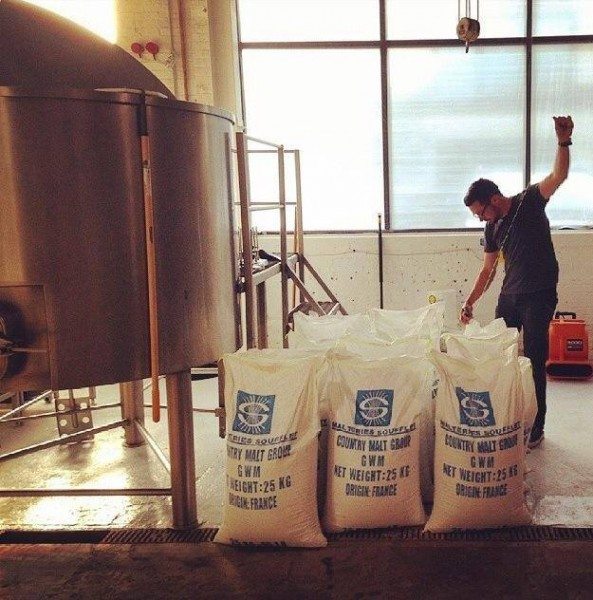
Taken on Ale Syndicate’s first brew day (via Facebook)
JE: Yeah — I’m not entirely sure if we’re the only ones, but if we’re not the only ones we’re pretty close. It’s all part of making the process easier for the next brewery down the line. That’s what Half Acre did, and that’s what 5 Rabbit did — you kinda have to go through the process and show the regulatory people that you’re serious about it, and this is a good thing that you do – then it’s also dependent really heavily on being able to work with the guys at Arcade.
You know, we’ve known them now…when their fermenters arrived we realized that we had met exactly three years before that day. Chris Toure, one of the owners, was originally an artist and he was doing kind of an arts administration piece that involved brewing so we’ve just bene big fans of them, their grapefruit IPA was the beer that really sold me on them. You know, two days ago — I guess it would have been Monday morning — we made the Grapefruit IPA and it was made in our brewery.
It’s good beer, it’s done with a neat concept behind it, I don’t know — the other thing too is that it’s completely different beer than what we make. I think that’s kind of like what’s real unique is that we’re multiplying things for craft fans instead of just replicating the same brewery over and over again.
GDB: And someone’s moving in next door, right? Mercenary?
JE: It’s about a block and a half away — the guys at Mercenary are doing a distillery and a small brewery. You have to get all the specifics from them…people are going to be coming to this area, to almost this like brewery hub.
GDB: It really is — and it’s funny how these places end up in such close proximity to each other. Are you guys looking at a taproom right now too, or is it too soon to talk about that?
JE: It’s too soon to say anything intelligible about it, I’ll tell you that. But that’s really like our dream. Right now we’re really highly focused on the production portion, but I have this great vision of being able to have the people in the brewery, not be separated from the brewery, but kind of part of it, and trying specialty beer — I know a lot of people are excited for that. We’ll have to deal with a lot of licenses and everything else.
GDB: This goes back a few months so you’ve had a while to sort through things — how did getting the Ratebeer “Best New IL Brewery award” affect you guys? Did the phone start ringing, did people start talking to you who maybe you couldn’t get through to before?
JE: That’s a good question. I have to start off by prefacing that I — I’m probably sounding grateful all over the board here but there’s nobody who hasn’t offered help, or turned us down if we asked for it. I mean, I’m talking about some of the most important people in beer in Chicago have always been super helpful. Not because we’re fans but because we’re legitimately working together and they don’t shut us out. So I’ve alwasy been really grateful of that.
The award, it feels good to have gotten. But the whole mission is making beer and getting the beer out the door, so I don’t know how much we actually paused to think about it. It was really a great honor to get, but every day we’re working and doing something else. We didn’t really pause to stop there.
GDB: But you have a new partnership beer with the Ritz Carlton, of all places.
JE: Yeah, we made a beer for them there [Tailor Fitted APA] — I think that’s one that we’re just doing for the summer. The Ritz Carlton was really great to us, and I don’t know – we’re pretty positive about that one.
GDB: Would you have been on their radar without being an award-winning brewery, do you think?
JE: Oh yeah! I think every little bit helps. I mean, a mention in Guys Drinking Beer doesn’t hurt either!
GDB: What’s the rest of the day look like in a brand new brewery?
JE: We’re just finishing up the brew. I just watched the dumpster get filled with spent grain, we just got everything set up and tonight is the Bad Apple 5th Anniversary. If you think about that — I mean, it’s their 5th anniversary, I mean they’re right across from Half Acre…so many of those things just weren’t there 5 years ago and now are, and now are like a thing to have anniversaries. It’s a good feeling.
Ale Syndicate’s beers can be found throughout Chicagoland. This interview has been edited and condensed.
